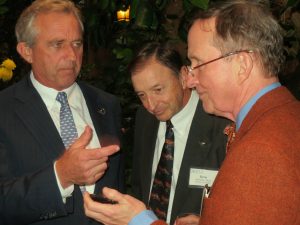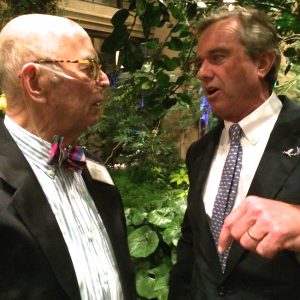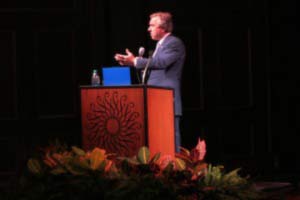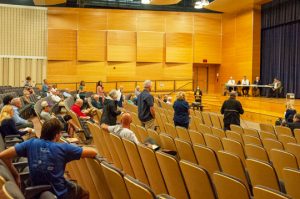During a prodigious, high-profile career that has run the gamut from arrests to accolades, a common theme emerges in the work of Robert F. Kennedy Jr.: water stewardship.
That distinction led him to Longwood Gardens on Thursday night, Oct. 23, where the 60-year-old activist received the 2014 Stroud Award for Freshwater Excellence. The honor is bestowed annually at the center’s Water’s Edge gala, a fundraiser that celebrates society’s most precious resource.

Following the reception, the audience heard an overview of Stroud’s numerous initiatives from its director, Bern Sweeney, who then introduced Kennedy. He responded with an impassioned, unscripted speech about the history and importance of clean water. At its conclusion, the crowd of several hundred rose to its feet.
“I think everyone in this room would agree that we could not find a more deserving person on the planet,” said Sweeney. He presented the award to Kennedy as the applause continued.
Deemed one of Time magazine’s 2010 “Heroes of the Planet,” Kennedy led the fight to restore the polluted Hudson River, negotiated the New York City Watershed Agreement, and serves as president of the Waterkeeper Alliance.
Since 1987, he has served as an environmental law professor and co-director of the Pace Environmental Litigation Clinic at Pace University School of Law. The clinic allows second- and third-year law students to get immersed in litigation against alleged Hudson River polluters. “If they don’t win the case, they don’t pass the course,” Kennedy joked.

Kennedy also serves as a senior attorney for the Natural Resources Defense Council, a New York-based nonprofit that works to expand environmental laws and restrict land use.
In 1998, he co-created a bottled-water company named Tear of the Clouds after the lake of the same name that feeds the Hudson River in the Adirondacks. The company donates all of its profits to Waterkeeper Alliance, which connects and supports more than 200 local Waterkeeper groups around the globe, a number Kennedy expects to more than double in the next couple of years.
Some of Kennedy’s advocacy has landed him in jail. In 2001, he was arrested for trespassing at Camp Garcia, the U.S. Navy training facility on the island of Vieques off the coast of Puerto Rico. Kennedy and others were protesting the use of the island for munitions training. The trespassing forced the suspension of live-fire exercises for almost three hours but also resulted in a 30-day jail sentence. In February 2013, while protesting the Keystone Pipeline, Kennedy was arrested again for blocking a thoroughfare in front of the White House.
The son of Sen. Robert F. Kennedy Sr. and the nephew of President John F. Kennedy, both of whom were assassinated in the 1960s, Kennedy Jr. said he knew he wanted to become an environmental advocate at a young age. He said he remembered visiting his uncle in the Oval Office with an ailing spotted salamander and expressing interest in writing a book about pollution.
The president arranged a meeting for him with Rachel Carson, the environmentalist and author of Silent Spring, he said. As for the poor salamander, it ended up being released into a White House fountain, where it likely expired, Kennedy said.
But in the ensuing decades, Kennedy’s activism has saved many fish and water creatures. He said time and again, the efforts of Waterkeeper Alliance and other advocacy groups have proven that nature is resilient. Using the Hudson River as an example, he said it was once the butt of national jokes.
“It caught fire; it turned colors,” Kennedy said. “Today it’s the richest waterway in the Atlantic.”
Kennedy said many of the cleanup successes could not have occurred without the Stroud Water Research Center. Calling it the gold standard of water protection, Kennedy said he first visited the center in 1999 and saw firsthand the commitment the Strouds had to “understanding the connections between nature and our culture.”
Since then, Kennedy said he had relied on Stroud to provide the scientific data that buttresses the environmental movement. For example, Kennedy said research has shown farmers that they can be more productive by using eco-friendly methods. He said the old argument that environmental protection had to be sacrificed for economic prosperity has been repeatedly debunked, he said.
Pollution is waste, which interferes with productivity and efficiency, Kennedy said. “Clean up after yourself like you learned in kindergarten,” he advised. Failure to do that will critically shortchange future generations, he said.
Proceeds from the Water’s Edge gala support freshwater research, restoration, and education programs at the Stroud Water Research Center. For more information, visit http://www.stroudcenter.org. Past recipients of the Stroud Award for Freshwater Excellence include Jane Lubchenco and Kathryn Sullivan, (2013), John Briscoe, (2012), and Olivia Newton-John and John Easterling (2011).



Comments